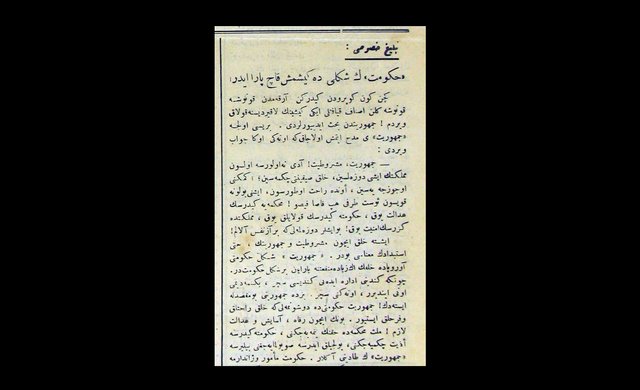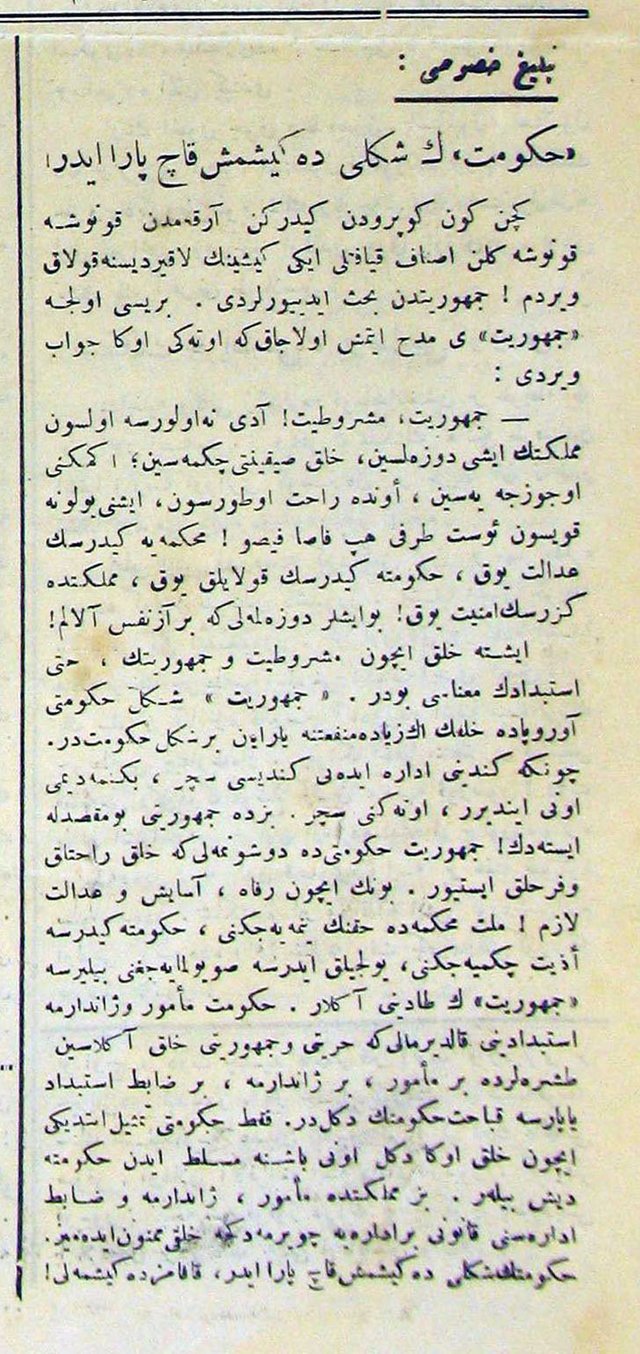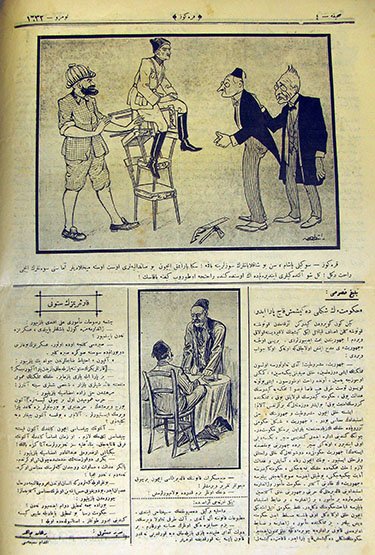Today in 1920s Turkey: 7 November 1923 (Changing Regimes or Changing Mentalities?)

(Column, Karagöz, 7 November 1923, no. 1632, page 4.)
Comments:
This column was published on the back page of Karagöz a week after Turkey was declared a Republic on 29 October 1923. It outlines the importance of justice and order in a good administration. The author begins his discourse with the example of two shopkeepers (representative of the people or the “pulse” of the nation) that he overheard in the city. Their disagreement over the merits of a Republican administration is used to highlight the core functions of all good governments, however they may define themselves.
The “public’s needs” listed by the shopkeeper below and later by the author are food, security, order, and justice. Unlike forms of governance, these basic human needs are indisputable, universal, and essential ingredients for the development of healthy people and societies. Most governments will at least claim to provide the necessary services to meet these basic needs regardless of whether they are autocracies or democracies. According to the author, the people who are in charge of carrying out these services on behalf of governments are the ones who, when corrupt, demonstrate the ineffectiveness of an administration. It is the human mediators between the government and people, any link in the chain of command, from corrupt police officers and gendarme to dicey politicians and bureaucrats can easily sour the deal for the very people they are responsible to serve. The article states that the people ultimately lay blame for such corruption on the government from which these unfit employees derive their authority. Thus, as long as those who work for the state are monitored and held responsible for their actions then the administration is seen as actually administering peace, prosperity, and justice among its citizens. Otherwise, if the government harbors and enables corrupt officials it does not matter by what means the administrative body is formed—be it hereditary right or democratic election—it will still be perceived as hindering public peace and order. Inadvertently claiming that this sort of corruption is still rampant, the author concludes that until the “Republic” can demonstrate its ability to fight corruption and run an efficient and fair administration that benefits rather than burden the people, this newest incarnation of government is but a nominal divergence from business as usual.

(Entire column, Karagöz, 7 November 1923, no. 1632, page 4.)
Türkçe
Hükümetin Şekli Değişmiş Kaç Para Eder!
Geçen gün köprüden giderken arkamdan konuşa konuşa gelen esnaf kıyafetli iki kişinin lakırdısına kulak verdim! Cumhuriyet’ten bahs ediyorlardı. Birisi evvelce Cumhuriyet’i methetmiş olacak ki öteki ona cevap verdi:
— Cumhuriyet, Meşrutiyet! Adı ne olursa olsun memleketin işi düzelsin, halk sıkıntı çekmesin; ekmeğini ucuzca yesin, evinde rahat otursun, işini yoluna koysun üst tarafı hep fasa fiso! Mahkemeye gidersin adalet yok, hükümete gidersin kolaylık yok, memlekette gezersin emniyet yok! Bu işler düzelmeli ki bir az nefes alalım!
İşte halk için Meşrutiyet ve Cumhuriyet’in, hatta istibdadın manası budur. Cumhuriyet şekil hükümeti Avrupa’da halkın en ziyade menfaatine yarayan bir şekl-i hükümettir. Çünkü kendini idare edeni kendisi seçer, beğenmedi mi onu indirir, ötekini seçer. Biz de Cumhuriyeti bu maksatla istedik! Cumhuriyet hükümeti de düşünmeli ki halk rahatlık ve ferahlık istiyor. Bunun için refah, asayiş ve adalet lazım! Millet mahkemede hakkının yenmeyeceğini, hükümete giderse eziyet çekmeceğini, yolculuk ederse soyulmayacağını bilirse Cumhuriyet’in tadını anlar. Hükümet memur ve jandarma istibdadını kaldırmalı ki hürriyeti ve Cumhuriyeti halk anlasın taşralarda bir memur, bir jandarma, bir zabıt istibdad yaparsa kabahat hükümetin değildir. Fakat hükümeti temsil ettiği için halk ona değil onu başına musallat eden hükümete diş biler. Biz memlekette memur, jandarma ve zabıt idaresini kanuni bir idareye çevirmedikçe halkı memnun edemeyiz. Hükümetin şekli değişmiş kaç para eder, kafamız değişmeli!
English
The Form of Government Has Changed [but] What Good Is It!
While crossing the bridge the other day I listened in on the conversation of two people dressed like shopkeepers walking behind me. They were talking about the Republic. As if one had praised the Republic earlier [in the conversation] the other responded:
— Republic or Constitutional Monarchy! Its name does not matter as long as the country’s affairs are put in order and the people aren’t suffering—they can eat their bread for cheap, comfortably live in their homes, make a living—then at the end of the day the rest is fiddle-faddle. You go to the courts and there is no justice, you go to the government there is no convenience, you go around the country there is no safety! These things must be corrected so that we can breathe a bit!
There you have it! For the people this is the meaning of Constitutional Monarchy, Republic, and even Autocracy. The republican form of government is the one form of government that has most benefitted the people of Europe. Because the people themselves choose who will manage them and if they don’t like [the selection] they remove [him] and choose the other. This is why we chose a Republic! The Republican government must assume that the people want comfort and happiness. For this prosperity, order, and justice are necessary! If the nation knows that their rights will not be violated in the courts, that when they go to the government they will not be troubled, that if they travel they will not be robbed then they will understand the taste of Republic. The administration must eliminate the despotism of the government official and gendarme so that the people understand freedom and the Republic; if a provincial government official, a gendarme or police officer is despotic this is not the government’s fault. But because they represent the government, rather than [resenting] these officers the people resent the government that sprung this affliction upon them. Until we turn this administration from one [dictated by the whims] of government officials, gendarme, and cops into one of justice we cannot satisfy the people. So the government has changed, what difference does it make—our mentality must change!

(Entire page, Karagöz, 7 November 1923, no. 1632, page 4.)
Note: Another post from Today in 1920s Turkey considers a specific example of corrupt motivations expressed in a cartoon published directly above this column, in the same issue of Karagöz. Drawing the reader’s attention to the unconditional support shown to the new administration by prominent members of the press, the cartoon highlights the dangers of a media incapable of objectively and critically mediating between leaders and citizens. (See post #121)
This article has been updated and modified from its first iteration published right here on Steemit on 7 November 2016. For the original version see:
30. Today in 1920s Turkey: 7 November 1923 (Changing Regimes or Changing Mentalities?)